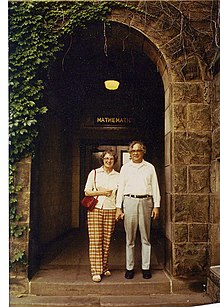William Boone (mathematician)
Appearance
William Werner Boone | |
|---|---|
 William W. Boone and Eileen Boone at Altgeld Hall, University of Illinois, 1979 | |
| Born | January 16, 1920 |
| Died | September 14, 1983 (aged 63) |
| Nationality | American |
| Alma mater | Princeton University |
| Known for | Boone–Higman theorem Boone–Rogers theorem Novikov–Boone theorem |
| Scientific career | |
| Fields | Mathematics |
| Institutions | University of Illinois at Urbana–Champaign Institute for Advanced Study |
| Doctoral advisor | Alonzo Church |
William Werner Boone (16 January 1920 in Cincinnati – 14 September 1983 in Urbana, Illinois) was an American mathematician. Alonzo Church was his Ph.D. advisor at Princeton, and Kurt Gödel was his friend at the Institute for Advanced Study.
Pyotr Novikov showed in 1955 that there exists a finitely presented group G such that the word problem for G is undecidable.[1] A different proof was obtained by Boone in 1958.[2]
Selected publications
- W. W. Boone, Decision problems about algebraic and logical systems as a whole and recursively enumerable degrees of unsolvability. 1968 Contributions to Math. Logic (Colloquium, Hannover, 1966), North-Holland, Amsterdam.
- W. W. Boone, Roger Lyndon, Frank Cannonito, Word Problems: Decision Problem in Group Theory, North-Holland, 1973.
References
- ^ Novikov, Pyotr S. (1955), "On the algorithmic unsolvability of the word problem in group theory", Proceedings of the Steklov Institute of Mathematics (in Russian), 44: 1–143, Zbl 0068.01301
- ^ Boone, William W. (1958), "The word problem" (PDF), Proceedings of the National Academy of Sciences, 44 (10): 1061–1065, Bibcode:1958PNAS...44.1061B, doi:10.1073/pnas.44.10.1061, PMC 528693, PMID 16590307, Zbl 0086.24701
- Kurt Gödel: Collected Works: Oxford University Press: New York. Editor-in-chief: Solomon Feferman, Volume IV: Correspondence, A–G, ISBN 978-0-19-850073-5.
- O'Connor, John J.; Robertson, Edmund F., "William Werner Boone", MacTutor History of Mathematics Archive, University of St Andrews
- William Werner Boone at the Mathematics Genealogy Project
